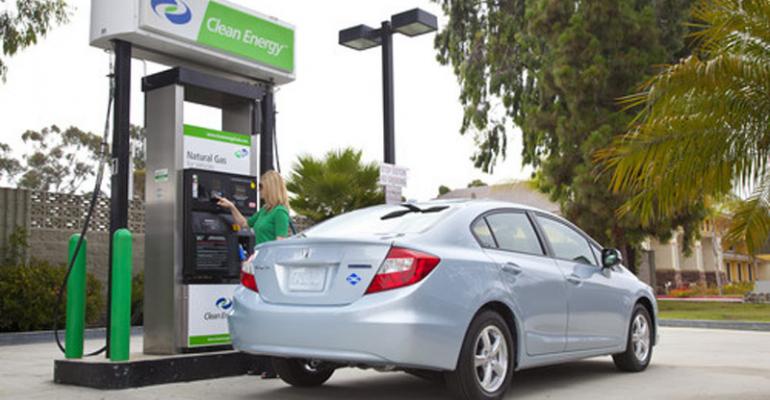DEARBORN, MI – The unsure future of the Earth’s resources and worldwide government expectations keep penny-pinching auto makers in a quandary when it comes to building powertrains.
But some top-ranking automotive engineers say consumers ultimately have the upper hand in determining future vehicle-engine technology.
Optimism about natural gas as a power source is expressed at the U.S. Department of Energy’s Directions in Engine-Efficiency and Emissions Research Conference here.
“It seems like we’re finding new reserves all the time,” Thomas McCarthy, Ford’s chief engineer-engine research and advanced engineering, says during a panel discussion.
But no auto maker is willing to commit to full-scale product lines of vehicles powered by natural gas – or diesel, or propane – for fear of changes in the market.
Compressed-natural-gas vehicles, for example, are hindered by limited numbers of fueling stations, McCarthy says. “The fleet market is able to leverage the CNG market,” but profits from mass-produced passenger-car versions aren’t expected in the near future.
Honda offers a CNG-powered Civic to non-fleet customers, the only auto maker in the U.S. to do so. Other car companies here won’t say whether they will do the same, but don’t rule out the possibility.
Environmental sustainability is important, McCarthy says. “It’s getting more difficult over time to make those right balances,” he says, but adds, “The opportunity exists to improve efficiency and reduce (carbon-dioxide) emissions through synergies between future fuel blends and engine technology.”
Audley Brown, General Motors director-global engine advanced engineering, says the auto maker is developing more urea-based after-treatments that release fewer toxins. And while the Chevrolet Volt extended-range electric vehicle remains a priority, GM will closely monitor a diesel-powered Chevrolet Cruze due within the next 18 months.
“I would love it if there was a roaring acceptance in the market” of diesels, Brown says. He predicts that smaller displacements, reduced friction and mass and improved thermal management will keep internal-combustion engines churning.
“Internal-combustion engines will remain predominant well into the foreseeable future,” McCarthy adds, citing Ford’s global C-platform lineup, which includes only one EV while the rest are ICE/hybrids.
Wolfgang Warnecke, chief scientist-mobility at Shell Global Solutions, cautions auto makers about the slow-simmering diesel trend in the U.S. He predicts diesel fuel will become far more expensive than the gasoline that will power smaller direct-injection engines.
The engineers here all agree the future still lies with drivers.
“Customers will determine the winners based on value and affordability, convenience and functionality,” McCarthy says. “I think it is important that we do a better job of marketing to customers to maximize the values of the technology that we put into the marketplace.”




